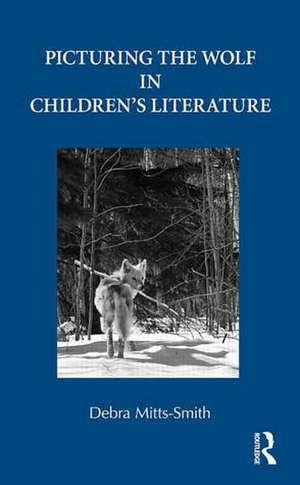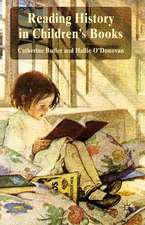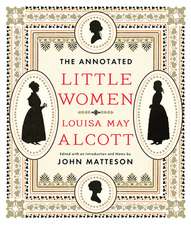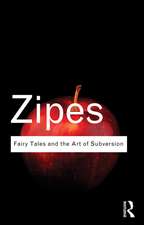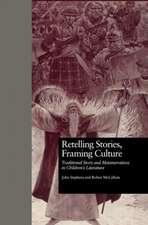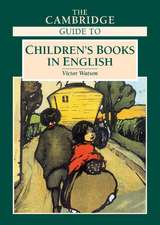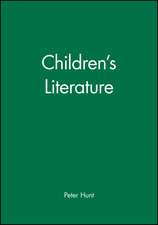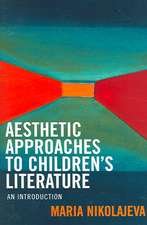Picturing the Wolf in Children's Literature: Children's Literature and Culture
Autor Debra Mitts-Smithen Limba Engleză Hardback – 24 iun 2010
First encountered in childhood, picture books act as a training ground where the young learn both how to decode the “symbolic” wolf across various contexts and how to make sense of “real” wolves. Mitts-Smith studies sources including myths, legends, fables, folk and fairy tales, fractured tales, fictional stories, and nonfiction, highlighting those instances in which images play a major role, including illustrated anthologies, chapbooks, picture books, and informational books. This book will be of interest to children’s literature scholars, as well as those interested in the figure of the wolf and how it has been informed over time.
| Toate formatele și edițiile | Preț | Express |
|---|---|---|
| Paperback (1) | 442.88 lei 6-8 săpt. | |
| Taylor & Francis – 30 mai 2012 | 442.88 lei 6-8 săpt. | |
| Hardback (1) | 1058.43 lei 6-8 săpt. | |
| Taylor & Francis – 24 iun 2010 | 1058.43 lei 6-8 săpt. |
Din seria Children's Literature and Culture
- 8%
 Preț: 381.91 lei
Preț: 381.91 lei -
 Preț: 340.85 lei
Preț: 340.85 lei -
 Preț: 372.91 lei
Preț: 372.91 lei -
 Preț: 369.71 lei
Preț: 369.71 lei -
 Preț: 310.36 lei
Preț: 310.36 lei - 9%
 Preț: 1005.31 lei
Preț: 1005.31 lei -
 Preț: 369.45 lei
Preț: 369.45 lei - 8%
 Preț: 464.67 lei
Preț: 464.67 lei - 9%
 Preț: 1004.18 lei
Preț: 1004.18 lei -
 Preț: 370.28 lei
Preț: 370.28 lei - 28%
 Preț: 877.59 lei
Preț: 877.59 lei - 18%
 Preț: 1113.25 lei
Preț: 1113.25 lei -
 Preț: 432.87 lei
Preț: 432.87 lei - 18%
 Preț: 1007.82 lei
Preț: 1007.82 lei - 15%
 Preț: 461.65 lei
Preț: 461.65 lei - 18%
 Preț: 942.92 lei
Preț: 942.92 lei - 18%
 Preț: 1106.05 lei
Preț: 1106.05 lei - 18%
 Preț: 1117.77 lei
Preț: 1117.77 lei - 18%
 Preț: 1117.07 lei
Preț: 1117.07 lei - 18%
 Preț: 1057.26 lei
Preț: 1057.26 lei - 28%
 Preț: 824.70 lei
Preț: 824.70 lei - 34%
 Preț: 409.04 lei
Preț: 409.04 lei - 18%
 Preț: 1055.66 lei
Preț: 1055.66 lei - 18%
 Preț: 1058.43 lei
Preț: 1058.43 lei - 18%
 Preț: 1114.30 lei
Preț: 1114.30 lei - 18%
 Preț: 1109.04 lei
Preț: 1109.04 lei - 18%
 Preț: 1111.87 lei
Preț: 1111.87 lei -
 Preț: 491.68 lei
Preț: 491.68 lei - 18%
 Preț: 1061.22 lei
Preț: 1061.22 lei - 18%
 Preț: 1058.79 lei
Preț: 1058.79 lei - 18%
 Preț: 1112.83 lei
Preț: 1112.83 lei - 18%
 Preț: 1057.40 lei
Preț: 1057.40 lei - 18%
 Preț: 1055.51 lei
Preț: 1055.51 lei - 18%
 Preț: 1055.51 lei
Preț: 1055.51 lei - 34%
 Preț: 352.20 lei
Preț: 352.20 lei -
 Preț: 482.74 lei
Preț: 482.74 lei - 18%
 Preț: 1058.43 lei
Preț: 1058.43 lei - 15%
 Preț: 544.28 lei
Preț: 544.28 lei - 18%
 Preț: 1059.14 lei
Preț: 1059.14 lei - 28%
 Preț: 822.36 lei
Preț: 822.36 lei - 18%
 Preț: 1109.66 lei
Preț: 1109.66 lei - 18%
 Preț: 1054.75 lei
Preț: 1054.75 lei - 25%
 Preț: 771.71 lei
Preț: 771.71 lei - 18%
 Preț: 1066.72 lei
Preț: 1066.72 lei - 18%
 Preț: 1006.43 lei
Preț: 1006.43 lei
Preț: 1058.43 lei
Preț vechi: 1290.78 lei
-18% Nou
Puncte Express: 1588
Preț estimativ în valută:
202.53€ • 211.46$ • 167.62£
202.53€ • 211.46$ • 167.62£
Carte tipărită la comandă
Livrare economică 04-18 aprilie
Preluare comenzi: 021 569.72.76
Specificații
ISBN-13: 9780415801171
ISBN-10: 0415801176
Pagini: 234
Ilustrații: 32 color halftones
Dimensiuni: 152 x 229 x 22 mm
Greutate: 0.56 kg
Ediția:1
Editura: Taylor & Francis
Colecția Routledge
Seria Children's Literature and Culture
Locul publicării:Oxford, United Kingdom
ISBN-10: 0415801176
Pagini: 234
Ilustrații: 32 color halftones
Dimensiuni: 152 x 229 x 22 mm
Greutate: 0.56 kg
Ediția:1
Editura: Taylor & Francis
Colecția Routledge
Seria Children's Literature and Culture
Locul publicării:Oxford, United Kingdom
Public țintă
Postgraduate and UndergraduateCuprins
List of Figures Series Editor’s Foreword Acknowledgments Introduction 1: Wolf as Predator 2: Wolf as Social Being 3: Wolf Undone 4: Wolf as Canine 5: Hunted and Endangered 6: Feral Children and Tame Wolves 7: Transcending Literature Bibliography Index
Recenzii
"Both scholars and environmentalists will be enlightened by this nuanced examination of a misunderstood creature and its impact in both the literary and natural worlds."
- Bulletin of the Center for Children's Books
- Bulletin of the Center for Children's Books
Descriere
From the villainous beast of “Little Red Riding Hood” and “The Three Little Pigs,” to the nurturing wolves of Romulus and Remus and Rudyard Kipling’s The Jungle Book, the wolf has long been a part of the landscape of children’s literature. Meanwhile, since the 1960s and the popularization of scientific research on these animals, children’s books have begun to feature more nuanced views. In Picturing the Wolf in Children’s Literature, Mitts-Smith analyzes visual images of the wolf in children’s books published in Western Europe and North America from 1500 to the present. In particular, she considers how wolves are depicted in and across particular works, the values and attitudes that inform these depictions, and how the concept of the wolf has changed over time. What she discovers is that illustrations and photos in works for children impart social, cultural, and scientific information not only about wolves, but also about humans and human behavior.
